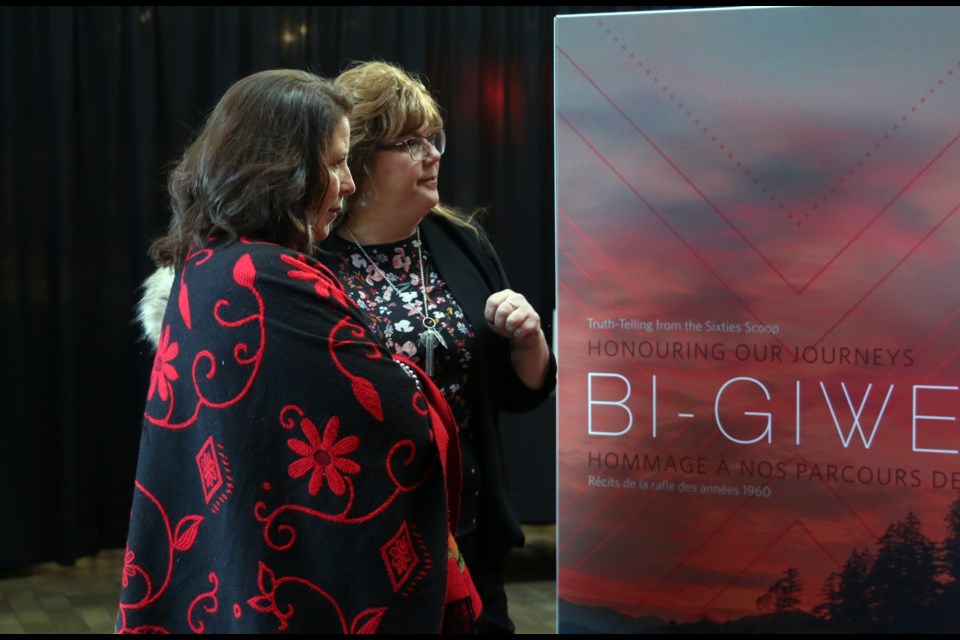THUNDER BAY - A child being taken from his or her home and placed with a strange family in a strange place seems like a nightmare for both children and parents. For thousands of Indigenous children growing up in Canada nearly 60 years ago, that nightmare was a reality, and the effects are still being felt today.
“If you think about trauma that people grow up with or experience, whether it’s losing your children or whether it was the child being removed from their community, the trauma of being placed in a completely foreign situation and trying to navigate that, it really does have a lasting impact on people,” said Denise Baxter, vice provost with Aboriginal Initiatives at Lakehead University.
Bi-Giwen: Coming Home – Truth telling from the Sixties Scoop, is a new exhibit that opened at Lakehead University on Monday and details the impact of the Sixties Scoop on Indigenous children and families through the personal stories of 12 survivors.
Baxter said the premise of exhibit is coming home and sharing stories of resilience and survival.
“One of the things the exhibit really talks about is never feeling a sense of belonging,” she said. “You don’t really belong in the home you have been adopted into, and you don’t belong when you go back to find your original home you were taken from.”
The Sixties Scoop was part of a Canadian government policy that saw tens of thousands of Indigenous youth removed from their homes and communities and placed with foster families, often of non-Indigenous background.
It is estimated that more than 20,000 Indigenous children were taken from their homes and put in foster care between the 1950s and 1980s.
“For many years, the stories that were shared were not our stories,” Baxter said. “So these particular stories of residential school survivors, Sixties Scoop survivors, those are our stories of our people, our cousins, my friends. It’s a story of a large segment of Canada. These particular stories are the result of policies by the Canadian government and not our people making those rules ourselves.”
The exhibit was created by the Legacy of Hope Foundation, a national Indigenous-led organization with the goal of educating and raising awareness about the intergenerational impacts of the residential school system and the Sixties Scoop.
It will be on display at Lakehead University until Friday and includes written stories of survivors, as well as video interviews people can listen to and watch.
Baxter said it is important for Lakehead to contribute to the wider learning of the community and not just students. The exhibit is open to the public and elementary school students will be attending the exhibit on Wednesday and Thursday.
The public is also invited to a talk by Indigenous author, Colleen Cardinal, who will be speaking about her experiences as a Sixties Scoop survivor and her book: Ohpikiihaakan-ohpihmeh (Raised somewhere else): A 60s Scoop Adoptee’s Story of Coming Home.
“Knowledge is power,” Baxter said. “The more we know about how things have been going on, what’s happened in this country, what’s happened in this city, the more proactive we can be in affecting change.”
Fort William First Nation councilor, Michele Solomon, said projects like the Sixties Scoop exhibit are central to educating people about Indigenous people’s experiences, which are sometimes overlooked.
“As society, it’s about becoming aware and making it a priority to gain some understanding about what this experience has been like and how it has had intergenerational impacts on Indigenous families and communities,” she said. “It’s important to understand that for non-Indigenous society.”
And it is also about helping those who have experienced the trauma heal. Many children who were taken from their family struggle with a loss of identity, but sharing these stories and educating the public, can help reclaim that identity.
“For us as Indigenous people it’s about reclaiming our identity and creating spaces to learn about the history of our people and sharing and loving each other and welcoming each other home,” Solomon said. “It’s more than just non-Indigenous society understanding and learning. It’s also reclaiming who we are intending to be.”
The Bi-Giwen: Coming Home – Truth telling from the Sixties Scoop Exhibit will be on display in the Agora at Lakehead University until Friday at 2:30, when closing ceremonies will take place.
